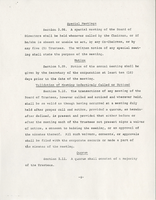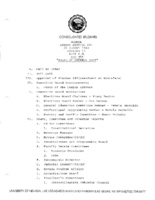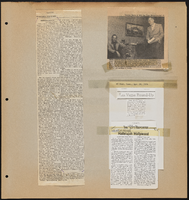Search the Special Collections and Archives Portal
Search Results

Interview with Robert Elmer Friedrichs, June 18, 2004
Date
Archival Collection
Description
Text

Transcript of interview with Dennis Ortwein by Claytee White, May 6, 2009
Date
Archival Collection
Description
Dennis Ortwein arrived in Las Vegas in 1956. He shares many details about growing up in Montana, his parents and siblings, his education, and the moment in time when he was offered an opportunity to work in Las Vegas. He also lays out the path his singing career took, starting with school plays, duets with his sister, and high school quartets. Once in Las Vegas, Dennis taught for a while, served as principal, and was involved in creating programs that helped integrate schools. He also talks about his church choir work, entertainment in early Las Vegas, above-ground testing at the Nevada Test Site, and anti-nuclear protests. Dennis served as lab school and student teaching coordinator in Nigeria. He offers several anecdotes and stories about the time he and his family spent there. After retiring early (age 53), Dennis acted as consultant to the Esmeralda County school board, executive director for the National Conference of Christians and Jews, and wrote a book. He is currently enjoying his singing career by appearing at conventions, in musicals, and at weddings and memorials.
Text
Florence McClure Papers
Identifier
Abstract
The Florence McClure Papers (1969-2007) are comprised of writings, correspondence, newspaper clippings, handwritten notes, and assorted publications that focus on McClure's work with women's organizations, her efforts on behalf of the Southern Nevada Women's Correctional Facility, and her political advocacy work. It also contains a large number of reference clippings McClure collected on women's issues from local, national, and international publications.
Archival Collection
Southern Nevada Daughters of the American Revolution Records
Identifier
Abstract
The Southern Nevada Daughters of the American Revolution Records primarily document the activities of three Southern Nevada chapters of the National Society Daughters of the American Revolution from 1950 to 2024. The materials center around the records of three chapters from Southern Nevada: Old Spanish Trail, Francisco Garces, and Valley of Fire. Materials include administrative records, scrapbooks, photographs, news clippings, and correspondence about the activities of the Daughters of the American Revolution chapters. Mateirals also include some records and scrapbooks from the Nevada State Society of DAR.
Archival Collection

By-laws of the Nathan Adelson Hospice, November 30, 1978
Date
Archival Collection
Description
The by-laws of the Nathan Adelson Hospice establish the purpose and organization of the program, founded in 1978 in Las Vegas.
Text

Hernando Amaya oral history interview: transcript
Date
Archival Collection
Description
Oral history interview with Hernando Amaya conducted by Laurents Banuelos-Benitez, Marcela Rodriguez-Campo, and Barbara Tabach on October 18, 2018 and December 3, 2018 for the Latinx Voices of Southern Nevada Oral History Project. In this interview, Hernando Amaya talks about his childhood and education in Bogota, Colombia. He discusses his start in journalism as a young man and working for El Espectador, the Colombian national newspaper. He discusses his experiences reporting on the narco-terrorism occurring in Medellin, Colombia and how this eventually led to his immigration to the United States. Amaya moved to Las Vegas, Nevada in 2001 and continued his career in journalism by working for local Spanish speaking papers and websites. He relates his civic involvement in the Las Vegas area, his work as the president of the Colombian Association of Las Vegas, and various other civic engagements. As a journalist, he asserts the importance of knowing one's culture, storytelling, learning history, and being active in the community.
Text

Meeting minutes for Consolidated Student Senate, University of Nevada, Las Vegas, August 30, 1983
Date
Archival Collection
Description
Text

Transcript of interview with Judy Lee (Johnson) Jones by Claytee D. White, February 22, 2007
Date
Archival Collection
Description
In the 1950s and 1960s, the Copa Room at the Sands Hotel and Casino featured glamorous showgirls. For a few years, the Houston Chronicle sponsored a contest that added the Texas Copa Girls to the line. In 1958, one of the winners was 17-year-old Judith Lee Johnson. For the "wild" but "naive" Judy, the experience was a period of funfilled freedom, followed by relentless encouragement of others to attend college, which she reluctantly did. To her surprise, she embraced the college life, took her studies seriously, and received an education degree. She also became Miss Houston. Four years later she returned to Las Vegas and the Sands. As she stepped into her role as a showgirl this second time, she was no longer the newbie. She experiences the lifestyle with more maturity. She talks about the celebrities she met, the lasting friendships she formed, performing in the Elvis movie Viva Las Vegas, and her trip around the world, a trip that included her personal dream of going to Paris. Judy shares details of her family heritage and she wonders to what extent she might have been living her mother's dream. Though her love of performance and theatre is keen, Judy channeled her passions into a 29-year career as an educator. She married a Marine in 1965, raised their children, moved with his career. She and her husband, Walter F. Jones, live in Virginia.
Text

Interview with Paul Guthals, April 14, 2005
Date
Archival Collection
Description
Text

